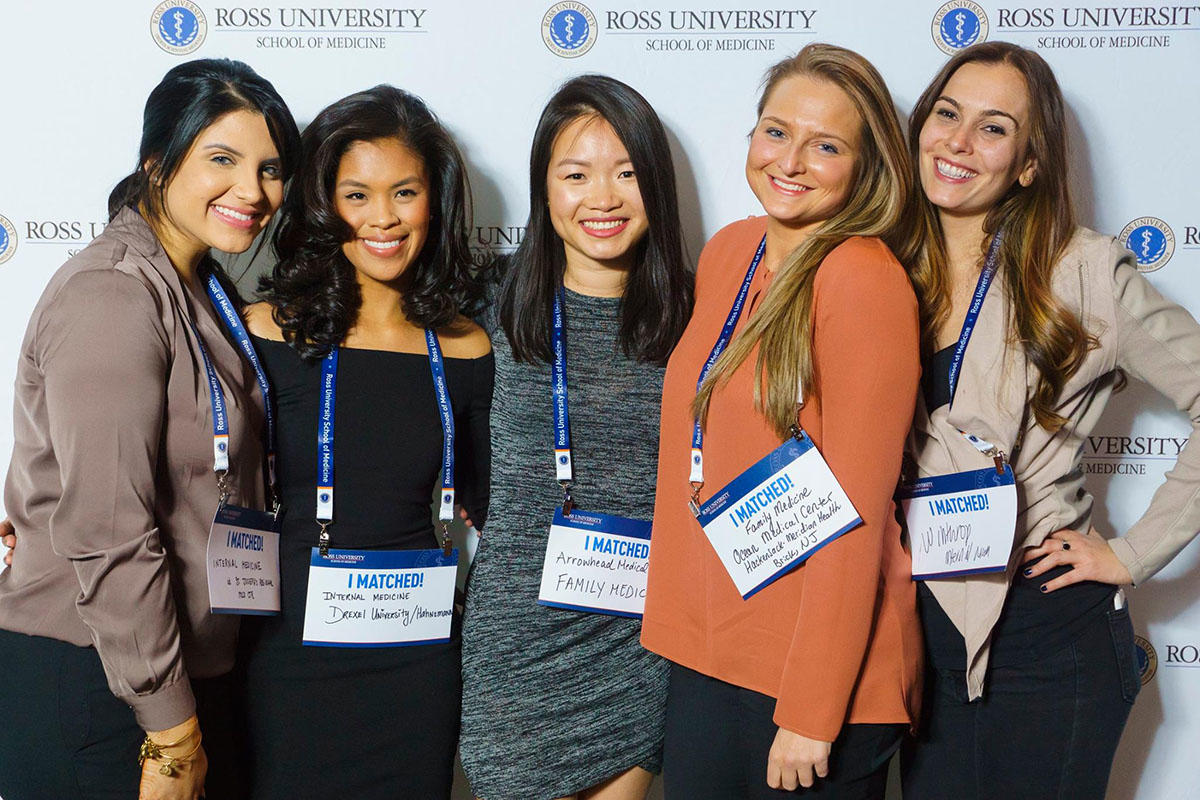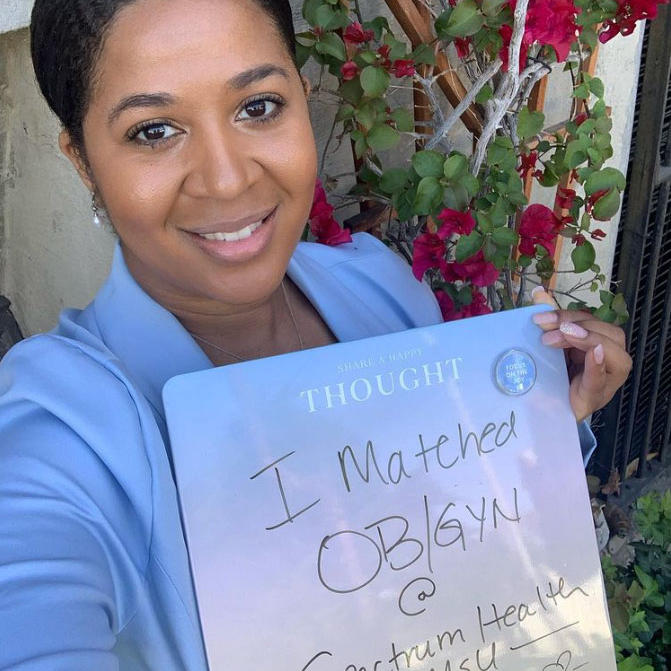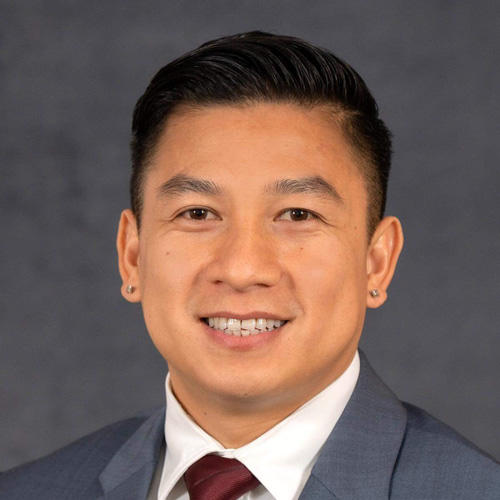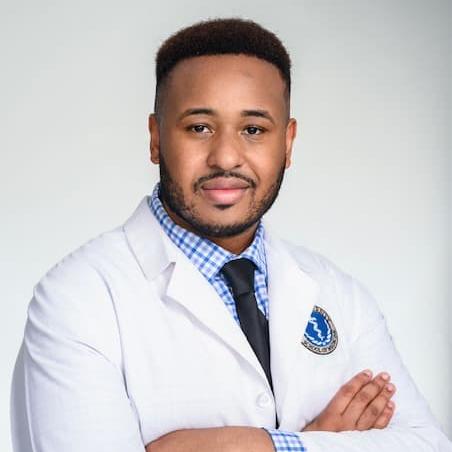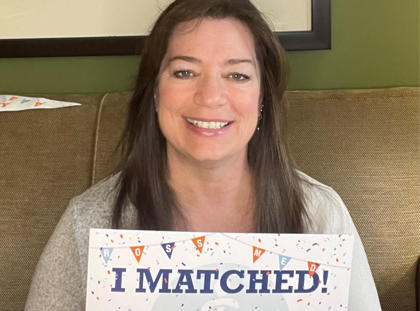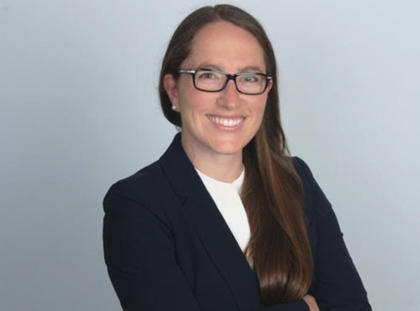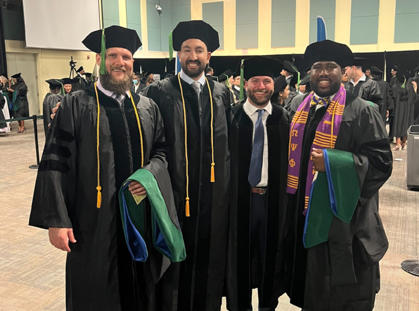Medical students know that getting a Doctor of Medicine (MD) degree is only the beginning of their journey. To start practicing medicine, doctors must first complete a postgraduate medical residency of three to eight years, depending on the specialty. Attaining a residency—preferably in the location and specialty of choice—is the critical goal for fourth-year medical students, also known as MS4s. Below, we’ll introduce you to some graduates of Ross University School of Medicine (RUSM), and listen to what inspired them to choose their particular discipline. We’ll hear how RUSM helped them through the residency application process, and what they remember about Match Day, the big Friday in March when MS4s learn their residency destiny.
Meet the Physicians
Match Day is often one of the most significant moments in a physician’s journey. With that level of buildup combined with the significance of the moment, it would be hard to believe Tishanna Ferguson, MD, slept through it all.
After a 12-year career in respiratory therapy, Nguyen returns to the ER as a physician.
The day that Ross University School of Medicine (RUSM) student Darrin Jalloh ‘22 got a phone call from the Internal Medicine program at Mount Sinai Hospital in Chicago, Illinois, was one of the most monumental days of his life.
The RUSM Office of Career Advisement: Helping Students Prepare for The MATCH℠
At RUSM, the Office of Career Advisement (OCA) helps MS4s through the residency application process. The OCA can even help students determine which residency discipline may suit them best. The OCA then assists students in navigating the National Resident Matching Program® (NRMP®)—a placement system which medical students who wish to become licensed in the United States use to “match” with a medical residency.
Medical students begin submitting residency applications in September of their fourth year. Programs start the interview process during that month, and interviews continue through the following January. After positive application responses and successful residency interviews, students create a “rank-order list” of preferred residency programs, which is matched against a similar list created by the programs. Students begin submitting their rank-order lists in February.
Q: What role did RUSM and the Office of Career Advisement play as you prepared for The MATCH?
Dr. Bhatia: They supported me and helped me choose the right specialty.
Dr. Gaston: The OCA told me when I needed to have things done, which was helpful. They told me that based on my scores, I should apply to both Emergency Medicine and Family Medicine. (I did not do this, but it is a good option.)
Dr. Rosen: RUSM and the OCA helped guide me to programs that might be a good fit for me.
Dr. Shah: RUSM provided considerable guidance throughout the process as well as polishing the application.
Q: What do you remember most from the residency application and interview process?
Dr. Gaston: How nerve racking it can be! I remember practicing my answers and making sure that I mentioned certain things in just the right way. When it came to the interviews, they were more like conversations, which were very helpful and fun. Programs want you to come to their institutions.
Dr. Okoye: It was a very stressful time, but I constantly reached out to those ahead of me for guidance.
Dr. Rosen: Really taking it in! After all the hard work, it felt so good to travel for interviews and see residency on the horizon.
Dr. Shah: How human the interaction is. It’s truly about finding the right “fit.”
Match Madness
The challenging application process and years of medical training culminate in March’s Match Week. On the Monday of Match Week, the NRMP informs applicants if they’ve matched to a residency program. Students don’t yet know which residency (they learn that on Friday)—only that they’ve been matched to a program. Match Monday is a happy occasion for most students. In 2021, RUSM had a first-time residency attainment rate of 92 percent for 2020-2021 graduates, a match percentage rate comparable with the overall match rate (93 percent) for medical schools in the United States.
Not all program positions are filled that Monday, however, and applicants who were not matched to a residency may still have hope. The Supplemental Offer and Acceptance Program® (SOAP®) provides further matching opportunities to students—and here is where the real madness begins! For students who haven’t been matched, they have one hour to investigate the remaining available positions. Students can submit up to 45 applications during that hour. Programs receive the applications and start building interview lists right away.
On Tuesday, programs begin phone and virtual interviews with SOAP applicants. For the next three days, programs extend offers and applicants accept or reject them. Through SOAP, almost all remaining first-year residency positions open to Doctor of Medicine (MD) seniors are filled.
Match Madness peaks on Friday morning: Match Day. For medical students, it is one of the most memorable and consequential days of their lives. In the past, medical students learned of their residency placements through sealed envelopes, opening them privately or sometimes announcing the contents to a gathered assembly. Today, residencies are commonly revealed through emails, as they are at RUSM. Whatever the process, there are smiles and tears and photos to remember the moment.
Q: Can you describe the feeling of finding out where and how you matched?
Dr. Bhatia: Exciting. Loved the match party!
Dr. Gaston: Thinking about it is immediately making me cry… it felt like a sigh of relief after four years of holding your breath. As a medical student, and more so as a Caribbean student, every time you turn around you think you're not going to make it for some reason or another. You're so used to failures and not measuring up. First medical school, then medical school exams, then board exams. It felt so good, I cried and I prayed and I praised God like a hundred times!
Dr. Okoye: I cried tears of joy!
Dr. Rosen: I was with my family in Los Angeles. I just celebrated the match result in Hollywood. It was an incredible feeling!
Dr. Shah: Euphoric! It makes you feel on top of the world after years of hard work.
Advice for Medical Students from RUSM Alumni
RUSM is one of the oldest and most accomplished Caribbean medical schools serving students primarily from the United States and Canada, and providing them with the foundation they need to pursue successful careers in medicine. Since 1978, RUSM has produced more than 15,000 alumni. Who better to turn to for the inside story and sage advice than a few of those RUSM-made MDs?
Q: What inspired you to apply for your residency specialty?
Dr. Gaston: All the experiences that drew me to medicine were emergency-medicine based. I was a team medic in Costa Rica for a mission trip and had a lot of small but acute issues that came up with my team and I loved it! I pulled someone out of a car on the side of the road in medical school, triaging them and reporting to the EMS once they arrived. When I joined the emergency medicine interest group, I knew they were my people based on the personalities and the speakers that would come to talk about emergency medicine. It was the perfect match for me.
Dr. Okoye: I have always enjoyed working with my hands and surgery gives me the opportunity to do that while also practicing medicine.
Dr. Shah: The challenging yet motivating responsibility of performing surgery to heal a patient, and a lifetime of improving and growing with new techniques, approaches, and outcomes.
Q: Do you have any advice for medical students who are planning to apply for your specialty?
Dr. Gaston: Oh my goodness yes! Especially for people of color who are few and far between and women of color even more so. Join interest groups for EM [emergency medicine] early if you're even considering it. I am now realizing and having to backtrack on things I should have known as a student about the specialty. Hurricane Maria distracted me a lot, but I should have joined the EM interest group when I was on the island [Barbados]. I should have been learning about SLOEs [standardized letters of evaluation] and presentation style of EM procedures, etc. But I didn’t learn any of that until much later. I’m lucky that I pushed myself enough that I ended up being okay, but it shows now that I was behind my peers in understanding that stuff. EM is very different from other specialties. It's a surgery subspecialty and you have to go to multiple audition rotations already knowing the culture and how they like things. Get a mentor early as well, quickly find an EM resident that matches your background, and have them on speed dial. That's what I did.
Dr. Rosen: Demonstrate consistency and commitment across the board. Stay yourself! Don’t feel like you need to do anything in particular (outside clinical duties) as a prerequisite to be accepted at a particular program. You want to shine on your application and be your most authentic self.
Dr. Shah: Be passionate about patient care, patient safety, and excellent outcomes.
Q: What do you wish you knew about your specialty before you started?
Dr. Rosen: Internal Medicine is vast and exciting. The cases you see as a medical student and may not understand completely will come back again and again with time. Don’t worry about needing to know everything about everything right now! As internists, we are held to our due diligence to remain current on evidence-based medicine. Our knowledge grows with every patient we see, even as attending physicians.
Dr. Shah: How fast it [general surgery] is evolving and the remarkable innovation going on.
Inside the Numbers
In 2021, 579 RUSM MDs matched across 16 medical specialties. Of those, 229 matched to internal medicine, 171 matched to family medicine residencies, 23 secured general surgery residencies, and 21 RUSM MDs matched to emergency medicine. Have a medical residency in mind? The American Association of Medical Colleges (AAMC) lists more than 135 medical specialties and subspecialties available for graduating physicians to pursue, and each one has its own residency path. Investigate the possibilities, consider how the specialties may fit your abilities, aspirations, and expectations—even your habits and personality. When you think you know your path, check out the RUSM MD program, gather your application materials, and apply for admission to Ross University School of Medicine.
Related Resources:

